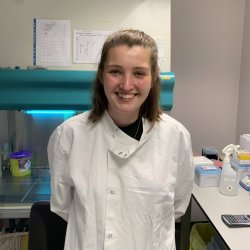
About
My research project
The characterisation and pre-clinical development of a novel dual activity anti-androgen for castration resistant prostate cancerThe project entails testing the efficacy and exploring the mechanism of action of new drugs for the advanced disease of prostate cancer. The drugs are provided by a collaboration partner from the chemistry department at the University of Cambridge and are novel inhibitors aiming to be superior to drugs currently used in the clinic.
Supervisors
The project entails testing the efficacy and exploring the mechanism of action of new drugs for the advanced disease of prostate cancer. The drugs are provided by a collaboration partner from the chemistry department at the University of Cambridge and are novel inhibitors aiming to be superior to drugs currently used in the clinic.
Publications
In the last decade, treatment for castration-resistant prostate cancer has changed markedly, impacting symptom control and longevity for patients. However, a large proportion of cases progress despite androgen deprivation therapy and chemotherapy, while still being fit enough for several more lines of treatment. Overstimulation of the androgen receptor (AR) activity is the main driver of this cancer. Targeting biological functions of the AR or its co-regulators has proven very effective in this disease and led to the development of several highly effective drugs targeting the AR signalling axis. Drugs such as enzalutamide demonstrated that the improvement in anti-tumour efficacy is closely correlated with an affinity for the AR and its activity and have established the paradigm that AR remains activity in aggressive disease. However, as importantly, key insights into mechanisms of resistance are guiding the development of the next generation of AR-targeted drugs. This review outlines the historical development of these highly specific agents, their mechanism of action in the context of defective AR activity, and explores the potential for the upcoming next-generation AR inhibitors (ARI) for prostate cancer by targeting the alternative domains of AR, rather than by the conventional ligand-binding domain approach. There is huge potential in these approaches to develop new drugs with high clinical activity and further improve the outlook for patients.
Abstract: Androgen receptor targeted therapies for prostate cancer have serious limitations in advanced stages of the disease. While resistance to the FDA-approved enzalutamide is extensively documented, novel therapies based on epichlorohydrin scaffolds (EPI) are currently in clinical trials, but display suboptimal pharmacokinetics. Herein, we report the synthesis and biological characterisation of a novel class of compounds designed through covalently linking enzalutamide and EPI-001 through various triazole based linkers. The compounds display a 100-fold improvement in the cell killing potency towards C4-2b PC cells compared to the gold standards of therapy, enzalutamide and EPI-001. The most promising compounds were proven to exhibit their toxicity exclusively through AR mediated pathways. This work sets the basis for the first class of hybrid AR inhibitors which successfully combine two drug moieties – EPI-001 and enzalutamide – into the same molecule.
Persistent androgen receptor (AR) signalling is the main driver of prostate cancer (PCa). Truncated isoforms of the AR called androgen receptor variants (AR-Vs) lacking the ligand binding domain often emerge during treatment resistance against AR pathway inhibitors such as Enzalutamide. This review discusses how AR-Vs drive a more aggressive form of PCa through the regulation of some of their target genes involved in oncogenic pathways, enabling disease progression. There is a pressing need for the development of a new generation of AR inhibitors which can repress the activity of both the full-length AR and AR-Vs, for which the knowledge of differentially expressed target genes will allow evaluation of inhibition efficacy. This review provides a detailed account of the most common variant, AR-V7, the AR-V7 regulated genes which have been experimentally validated, endeavours to understand their relevance in aggressive AR-V driven PCa and discusses the utility of the downstream protein products as potential drug targets for PCa treatment.